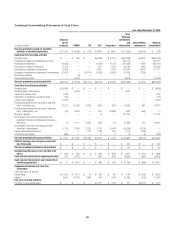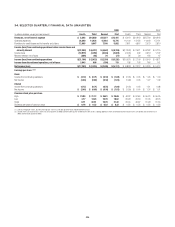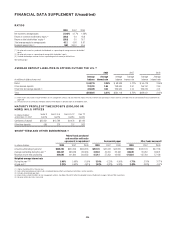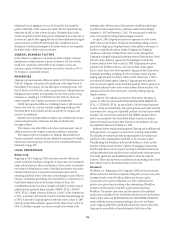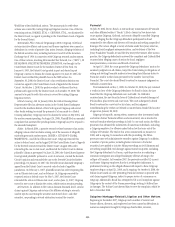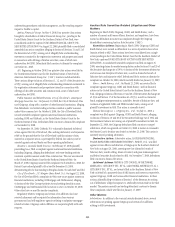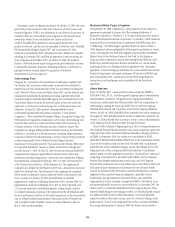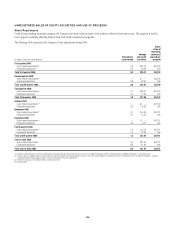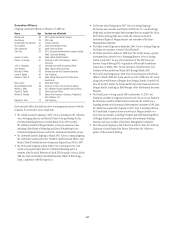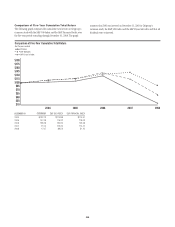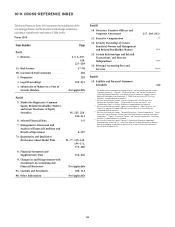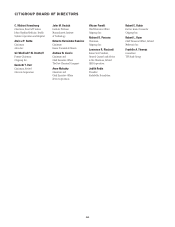Citibank 2008 Annual Report Download - page 240
Download and view the complete annual report
Please find page 240 of the 2008 Citibank annual report below. You can navigate through the pages in the report by either clicking on the pages listed below, or by using the keyword search tool below to find specific information within the annual report.Defendants’ motion to dismiss was denied. On October 13, 2004, the court
granted in part the motion to certify class actions for six focus cases in the
securities litigation. CGMI is not a defendant in any of the six focus cases. In
December 2006, the United States Court of Appeals for the Second Circuit
reversed the District Court and held that the classes could not be
certified. Plaintiffs filed a petition for rehearing in January 2007; that
petition was denied, and the case was remanded to the lower court. Plaintiffs
filed amended pleadings in August 2007 and a new motion for class
certification in September 2007. Defendants moved to dismiss the amended
pleadings in November 2007 and filed an opposition to the new motion for
class certification in December 2007. On March 26, 2008, the Southern
District of New York denied in part and granted in part Defendants’ motions
to dismiss the amended complaints. Following mediation, a settlement in
principle has been reached, subject to negotiation of definitive
documentation and court approval.
Interchange Fees
Citigroup Inc. and certain of its subsidiaries are defendants, together with
Visa, MasterCard, and various other banks, in actions filed on behalf of a
putative class of retail merchants that accept Visa and MasterCard payment
cards. The first of these actions was filed in June 2005, and the lawsuits were
subsequently consolidated for pretrial proceedings, together with related
lawsuits brought by individual plaintiffs against Visa and MasterCard, in the
United States District Court for the Eastern District of New York under the
caption In re Payment Card Interchange Fee and Merchant Discount
Litigation. On April 24, 2006, putative class plaintiffs filed a First
Consolidated and Amended Class Action Complaint (“Consolidated
Complaint”). The Consolidated Complaint alleges, among other things, that
Defendants have engaged in conspiracies to set the price of interchange and
merchant discount fees on credit and off-line debit card transactions, in
violation of Section 1 of the Sherman Act and a California statute. The
complaint also alleges additional federal antitrust violations by Defendants
of Section 1 and Section 2 of the Sherman Act, including alleged unlawful
contracts in restraint of trade pertaining to various rules governing merchant
conduct maintained by Visa or MasterCard and alleged unlawful
maintenance of monopoly power by Visa and its member banks. The District
Court granted Defendants’ motion to dismiss all claims for damages that
pre-date January 1, 2004. On May 22, 2006, the putative class plaintiffs filed
a supplemental complaint against MasterCard and certain other bank
defendants, including Citigroup Inc. and certain of its subsidiaries, alleging
that MasterCard’s initial public offering (“IPO”) in 2006 violated Section 7
of the Clayton Act and Section 1 of the Sherman Act. The supplemental
complaint also alleged that the MasterCard IPO was a fraudulent conveyance
under New York state law. The defendants to the supplemental complaint
filed a motion to dismiss its claims, which the District Court granted, with
leave to amend. On January 29, 2009, plaintiffs filed an amended
supplemental complaint challenging MasterCard’s IPO, and also filed (1) a
supplemental complaint challenging Visa’s IPO on similar grounds, and
(2) a second amended consolidated complaint, adding claims related to
(a) alleged continuing violations of the antitrust laws by all defendants after
the Visa and MasterCard IPOs, (b) PIN debit transactions on the Visa network
and (c) alleged unlawful maintenance of monopoly power by MasterCard
and its member banks. Plaintiffs’ motion for class certification, filed on
May 8, 2008, remains pending.
Wachovia/Wells Fargo Litigation
On September 29, 2008, Citigroup Inc. announced that it had reached an
agreement-in-principle to acquire all of the banking subsidiaries of
Wachovia Corporation (“Wachovia”) in an open-bank transaction assisted
by the Federal Deposit Insurance Corporation. On October 3, 2008, Wachovia
announced that it had entered into an agreement with Wells Fargo & Co.
(“Wells Fargo”) for Wells Fargo to purchase Wachovia. Since October 4,
2008, litigation has been instigated by all three parties and others in various
courts, including the New York State Supreme Court and the United States
District Court for the Southern District of New York. In this litigation,
Citigroup seeks compensatory and punitive damages from Wachovia and
Wells Fargo and their respective directors and advisors on various claims,
including violation of a binding exclusivity agreement (the “Exclusivity
Agreement”) between Citigroup and Wachovia; tortious interference with the
Exclusivity Agreement; and unjust enrichment. Wachovia and Wells Fargo
seek, among other relief, a declaration that the Wells Fargo-Wachovia
transaction is valid and proper and not prohibited by the Exclusivity
Agreement.
Other Matters
Leber. In October 2007, a purported class action complaint, LEBER v.
CITIGROUP INC., ET AL., was filed against Citigroup and its administration
and investment committees, alleging that they engaged in prohibited
transactions and breached their fiduciary duties of loyalty and prudence by
authorizing or causing the Citigroup 401(k) Plan to invest in Citigroup-
affiliated mutual funds and to purchase services from Citigroup-affiliated
entities. On July 18, 2008, plaintiffs filed an amended class action complaint.
On August 29, 2008, defendants filed a motion to dismiss the complaint. On
October 31, 2008, plaintiffs filed a motion to certify a class of all participants
in the Citigroup 401(k) Plan from 2001 through the present.
Pension Plan Litigation. Beginning in June 2005, certain participants in
the Citigroup Pension Plan filed putative class action complaints against the
Citigroup Pension Plan and other Citigroup defendants, alleging violations
of ERISA. In September 2005, the claims were consolidated as IN RE
CITIGROUP PENSION PLAN ERISA LITIGATION in the United States District
Court for the Southern District of New York. Plaintiffs filed a consolidated
amended class action complaint alleging, among other things, that (i) the
Citigroup Pension Plan is impermissibly backloaded due to insufficient
interest credits, (ii) the Citigroup Pension Plan’s “fractional test” method of
computing accrued benefits is precluded under ERISA, (iii) the Citigroup
Pension Plan illegally discriminates based on age, and (iv) Citigroup
Pension Plan participants were not provided proper notice that the 2000 and
2002 cash balance amendments would reduce the rate of future benefit
accrual. In December 2006, the District Court denied defendants’ summary
judgment motion, granted summary judgment to plaintiffs on their
backloading, age discrimination and notice claims, and ordered the
Citigroup Pension Plan reformed to comply with ERISA. The District Court
also granted plaintiffs’ motion for class certification. In November 2007, the
District Court: (i) ordered that defendants fix the Citigroup Pension Plan’s
unlawful backloading by increasing pay credits, (ii) denied plaintiffs’ request
for additional relief on their backloading claims, (iii) denied plaintiffs’
request for relief on their notice claims, and (iv) reserved its rulings on the
proper remedy, if any, for the Citigroup Pension Plan’s violation of ERISA’s
ban on age discrimination. In January 2008, the District Court entered a
234


